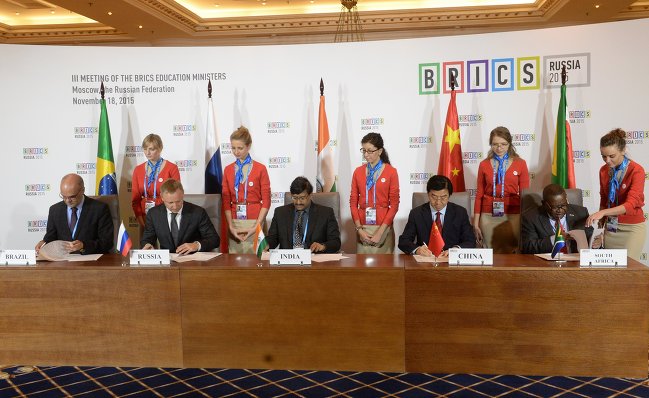On 18 November 2015, Moscow hosted the Meeting of the BRICS Education Ministers.
The meeting was attended by Minister of Science and Education of Russia Dmitry Livanov; Luiz Claudio Costa, Vice-Minister of Education of the Federative Republic of Brazil; Du Yubo, Vice-Minister of Education of the Peoples` Republic of China; Subramaniam Reddi, Additional Secretary of the Ministry of Human Resource and Development of the Republic of India; and Bonginkosi Emmanuel Nzimande, Minister of Higher Education and Training of the Republic of South Africa.
Meeting participants signed the Memorandum of Understanding for Establishment of the BRICS Network University, the main founding document of this agency.
Russia’s Minister of Science and Education, Dmitry Livanov, believes that the BRICS Network University will positively influence the development of cooperation between BRICS countries’ universities.
“We believe the expanded initiative to establish the BRICS Network University will positively influence the quality of higher education in Russia and will strengthen cooperation between the universities of our countries,” Mr Livanov noted.
He also said that one purpose of the BRICS Network University was to train a new generation of skilled, dedicated and motivated experts who understand the emerging BRICS economies. Livanov added that university students will not have to pay tuition fees, which are to be paid by the BRICS countries.
“Russia will be represented by the Ural Federal University, which will be a coordinator of the BRICS Network University. So, if Russia hosts the university head office, it will most probably be located in Yekaterinburg,” Livanov said.
In his speech, Russia’s Deputy Minister of Science and Education Aleksandr Klimov said the BRICS Network University would launch systematic student exchanges. He also noted that no more than 12 universities from each BRICS country would be included in the network during the first stage. The work will focus on energy, computer sciences and information security, ecology and climate change, water resources and economics.
Participants in the meeting also discussed promoting the exchange of information and ways to motivate postgraduate students and young researchers. Short-term network education programmes at summer schools were also discussed.
The meeting resulted in the signing of the Moscow Cooperation Declaration and the Memorandum of Understanding for Establishment of the BRICS Network University.
